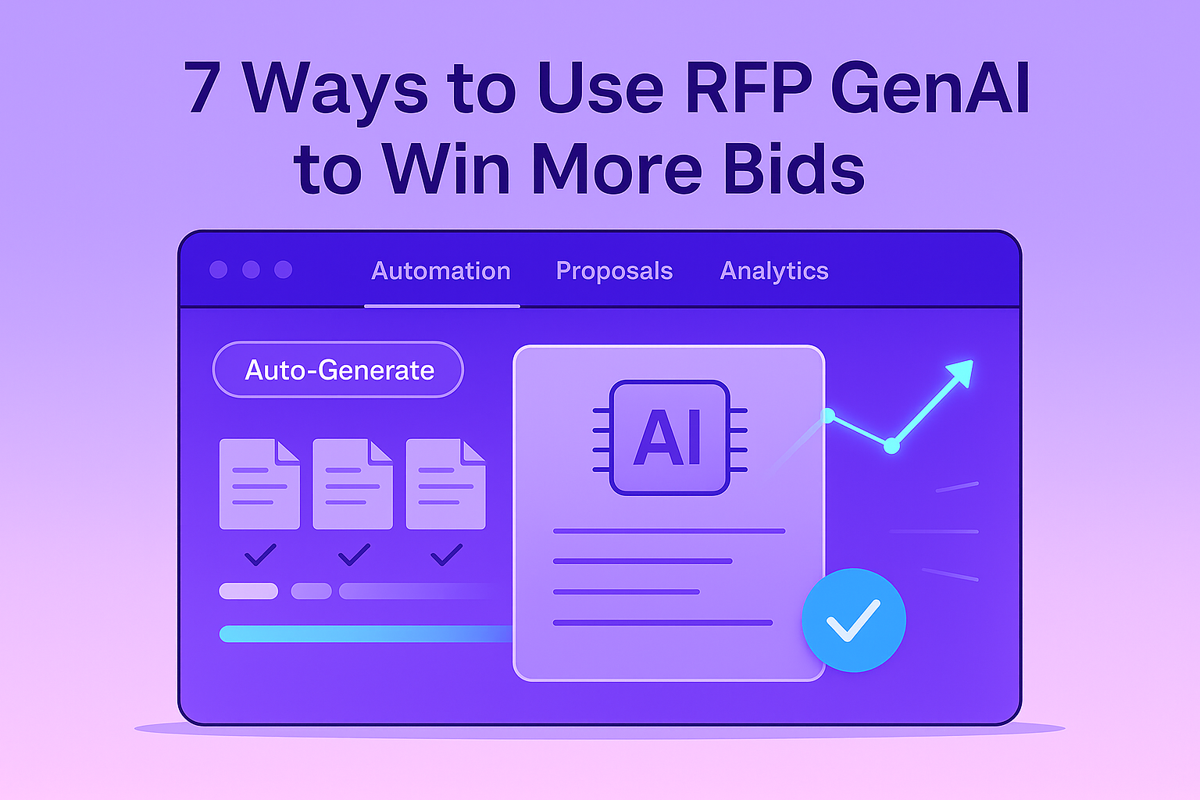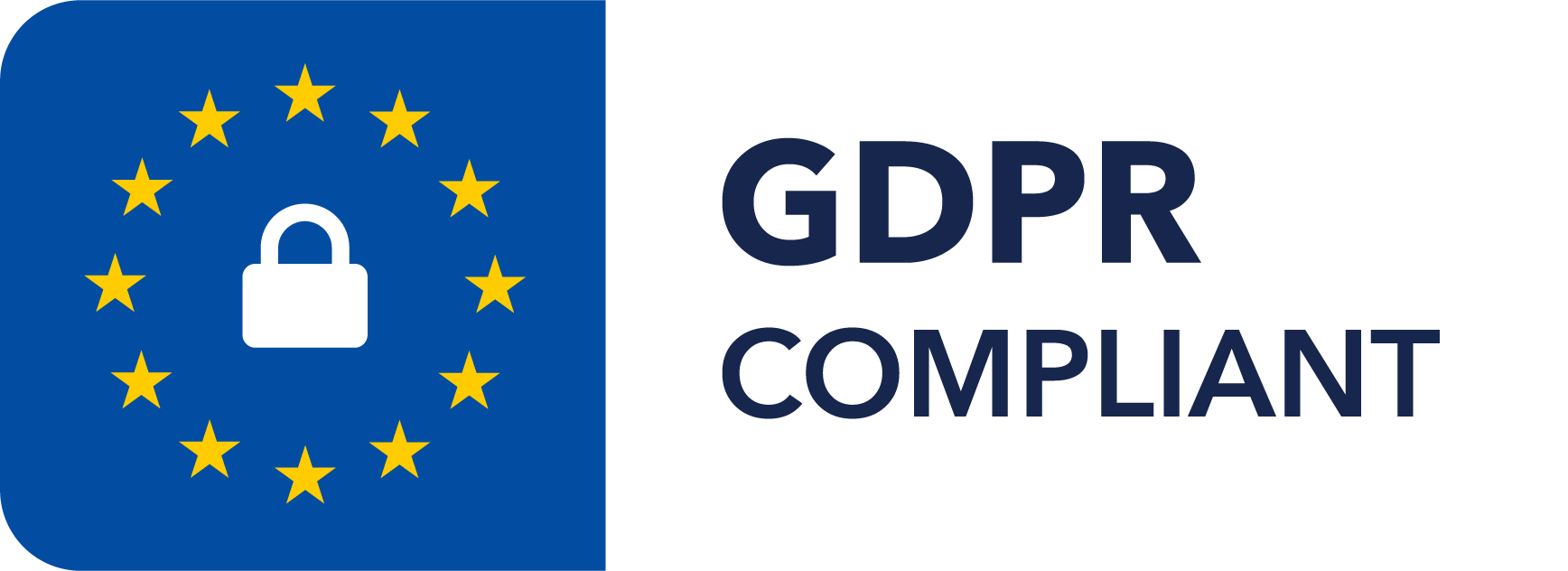7 Ways to Use RFP GenAI to Win More Bids
March 16, 2025
By
Evie Secilmis

Generative AI for RFPs is revolutionizing the way companies handle Request for Proposal (RFP) writing. By automating repetitive tasks, enhancing accuracy, and speeding up proposal creation, generative AI technology enables businesses to produce compelling and customized bids quickly, allowing them to concentrate on strategic growth. RFP generative AI solutions also ensure proposals are aligned with the latest industry standards, improving the chances of success.
Understanding Generative AI and Its Role in RFP Writing
RFP generative AI refers to advanced AI systems capable of producing new content based on specific prompts. Unlike traditional AI that predicts outcomes based on historical data, GenAI identifies patterns to generate original content, making it particularly useful for complex tasks like drafting RFPs.
Common Challenges in Writing RFP Proposals
1. Tight Deadlines and Financial Strain
Crafting thorough proposals often requires significant time and resources, leading to financial pressures, especially if bids are unsuccessful.
2. Coordinating Across Teams
RFPs necessitate input from various departments, making coordination challenging and potentially slowing progress.
3. Deciphering Ambiguous RFPs
Vague or incomplete instructions in RFPs can make it difficult to identify core requirements, risking misalignment with client expectations.
4. Accessing Critical Information
An unorganized content library can lead to inefficiencies, as teams may waste time searching for previous responses.
How Generative AI Streamlines the RFP Process
Faster and More Accurate Drafts
AI swiftly generates comprehensive drafts, incorporating industry insights and competitor research for tailored submissions.
Reduced Reliance on Subject Matter Experts
Automated content generation minimizes the need for constant SME involvement, allowing experts to focus on strategic tasks.
Accelerated Proposal Turnaround
Automation enables faster proposal production, increasing the volume of bids and enhancing efficiency.
Leveraging Generative AI for Efficient RFP Creation
1. Analyze and Shred the Proposal
AI automates the extraction of key requirements, ensuring no critical details are overlooked.
2. Rapid First Draft Generation
Utilizing a well-organized content library, AI crafts accurate first drafts by analyzing previous proposals and showcasing past successes.
3. Conduct Competitive Analysis
AI evaluates competitor activity through public information, providing insights to position bids strategically.
4. Personalize with Automated Research
By analyzing client-specific information, AI tailors proposals to align with the client's values and objectives.
5. Set Competitive Pricing
AI analyzes market data to suggest optimal pricing strategies, enhancing financial accuracy in proposals.
6. Manage Review Cycles
AI-driven project management tools facilitate seamless review cycles, ensuring compliance and timely approvals.
7. Enhance Design and Editorial Quality
Beyond content creation, AI assists with visual elements, refining language, and generating charts to polish submissions.
The Future of RFPs with AI
AI is fundamentally reshaping how organizations approach RFPs by automating labor-intensive tasks and improving accuracy. This transformation empowers businesses to create compelling, high-quality proposals more efficiently, allowing them to focus on strategic initiatives and delivering superior client solutions.
By embracing AI-driven solutions, companies can streamline their RFP processes, reduce manual workloads, and enhance the overall quality of their proposals, positioning themselves for greater success in a competitive market.
Real-World Applications of Generative AI in RFPs
Generative AI is no longer a theoretical advantage—it’s an operational reality transforming how organizations across industries handle RFPs. By applying machine learning and natural language generation to proposal management, teams are cutting turnaround times, improving response quality, and winning more business.
Enterprise Sales
In enterprise sales, time is often the deciding factor between closing and losing a deal. Generative AI tools automate the first draft of proposals using pre-approved content libraries and contextual data, enabling sales teams to deliver polished, customized responses in hours rather than days. This automation allows sales professionals to focus on strategy, storytelling, and customer engagement—areas where human judgment still matters most.
Consulting Firms
Consulting teams frequently juggle multiple complex bids simultaneously. Generative AI simplifies this process by identifying reusable content from prior proposals, aligning responses with client needs, and ensuring consistency across multiple deliverables. AI-driven analytics can also highlight which proposal formats, themes, or pricing structures have historically performed best, helping firms refine their bidding strategy over time.
Government Contracting
In government procurement, compliance and accuracy are paramount. AI helps teams parse large, detailed RFPs to extract key requirements, cross-reference them against existing documentation, and auto-generate compliant responses. These systems also reduce human error and ensure that submissions adhere to strict formatting and regulatory standards—an advantage in highly competitive bidding environments.
Across all sectors, the result is the same: fewer manual tasks, faster turnaround, and more strategic, data-informed proposals. As generative AI continues to evolve, organizations that adopt these technologies early will gain a measurable edge in efficiency, accuracy, and win rates.
Frequently Asked Questions
What is RFP generative AI and how does it help with RFPs? RFP generative AI uses advanced algorithms to create or suggest content automatically. For RFPs, it can draft tailored responses, generate compelling proposals quickly, and improve accuracy, helping teams submit higher-quality bids that stand out to evaluators.
How can generative AI increase RFP win rates? By automating content creation and personalization, generative AI helps produce more relevant and detailed responses faster. This leads to consistent, well-crafted proposals that better meet client needs, improving the chances of winning competitive bids.
Does generative AI reduce the time needed to complete RFPs? Yes, generative AI significantly reduces the time by automating repetitive writing tasks and quickly generating draft answers. It accelerates collaboration and editing, allowing teams to focus on strategy and customization instead of starting from scratch.
Can generative AI ensure compliance and accuracy in RFP responses? Absolutely. Generative AI tools can be trained on company standards and regulatory requirements to ensure responses align with compliance needs. They also reduce human error by cross-referencing past approved answers and flagging inconsistencies.
Is generative AI suitable for all sizes of businesses responding to RFPs? Yes. From startups to large enterprises, generative AI scales to fit different needs and budgets. Smaller teams gain efficiency and speed, while larger organizations benefit from consistent messaging and managing complex, high-volume RFP workflows.
Share this post
Link copied!




















